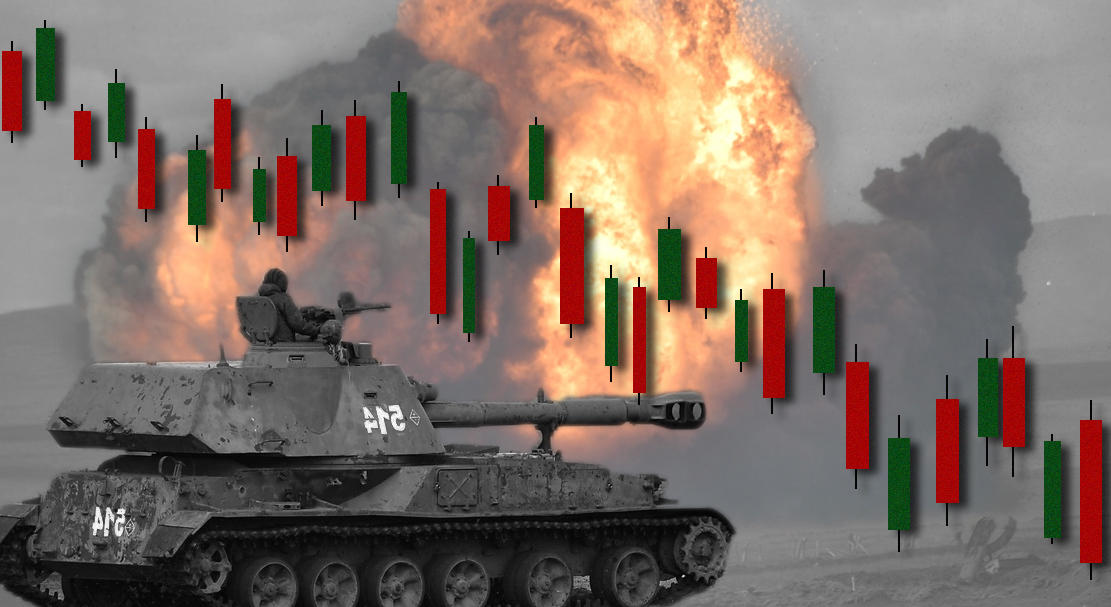The crisis in Ukraine has created a perfect inflationary storm. The war, the western sanctions on Russia, the pandemic, protectionism and climate change are unravelling decades of low commodity prices in a crisis that is only getting deeper.
This unprecedented concatenation of factors is preparing a disaster, as summed up in a sobering analysis by Pascal Lamy, former Director-General of the World Trade Organisation:
“Frankly speaking, when I look at things to come, I’m pretty horrified, and I’ve been in international issues for, what, 30, 40 years of my life. I think I never saw a period where the risks were as high with this cumulation of Covid impact on the world economy, especially on developing countries; the food crisis; the energy price crisis; the debt crisis, which is looming in many parts of the developing countries; the impact of this on the financial system. I see risks piling up. And of course, you know, the invasion of Ukraine is a sort of straw that really could break the camel’s back, and I’m much more worried than I’ve ever been in the last decades, unfortunately.” (‘Le Pen, patriots and the anti-globalist movement’, Financial Times)
Food industry in crisis
Russia's invasion of Ukraine has caused a huge set of problems for the world economy. In the first instance, Ukraine and Russia are responsible for a large proportion of the world's food supply. Together they produce 12 percent of the world's tradeable calories, but they only have 2 percent of the global population between them. Their grain exports in particular are a crucial lifeline to countries in the Middle East, but the crisis is having an impact on prices worldwide.
Ukraine's harvests are being badly affected by the war. Much of last year's crop is still stuck in warehouses, and this year's crop will be hampered by the war in numerous ways: parts of the country are occupied by Russia, and there is major disruption of infrastructure, whether by bombs or by being used by the military. There is also a shortage of labour power as many men have been conscripted into the army.
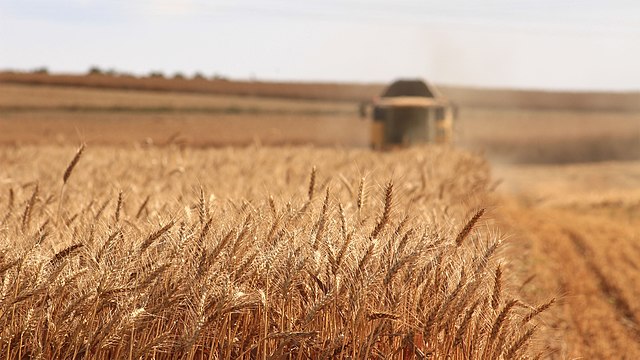 Russia's invasion of Ukraine has caused huge problems for the world economy – in the first instance, Ukraine and Russia are responsible for a large proportion of the world's food supply / Image: meriç tuna, Wikimedia Commons
Russia's invasion of Ukraine has caused huge problems for the world economy – in the first instance, Ukraine and Russia are responsible for a large proportion of the world's food supply / Image: meriç tuna, Wikimedia Commons
Meanwhile, Russia has banned exports of food to ensure its own supplies. Its exports are also being restricted by western sanctions.
As a result, wheat prices have increased by one third, which is a massive jump, and they are predicted to increase by another few percent before the end of the year. This will have devastating consequences for those that rely on bread as their main source of calories. But it will inevitably also have knock-on effects on other foodstuffs, as people switch to eating rice, potatoes etc.
The issue of climate change is also a factor in the equation. For example, the recent heat wave in India hit the wheat production hard, and the forecast of this year’s wheat crop is down 5 percent. This constitutes another blow to the world market for wheat, which can't afford any more shocks to supply.
Food prices in general on the wholesale market are up 55 percent since 2020, and 17 percent since the beginning of the year. This is having a major impact on the poor across the world. Sub-Saharan Africa, for example, imports 85 percent of its wheat, and food accounts for 40 percent of consumer spending in the region. In an attempt to ease the strain, the current Director-General of the WTO, Ngozi Okonjo-Iweala, recently went begging to Brazilian President Jair Bolsonaro, asking him to take measures to increase production of food. “I’m very concerned about the pending food crisis and steps we need to take,” she told journalists in Washington. (‘Export bans on food push global prices higher”, New York Times, 2 May)
To make matters worse, the price of fertiliser has doubled since last year. Russia was the world's largest exporter of fertiliser, and has now banned exports. On top of that, natural gas is a key component in production of fertiliser, and gas prices, as is well known, have shot through the roof.
However, the war is only intensifying problems that already existed. Prices of urea rose by 50 percent between March and October last year, leading China to introduce barriers to fertiliser exports. They are trying to keep prices on the Chinese market below those of the world market.
Anecdotally, the combination of increased costs of energy and fertiliser is wreaking havoc in food production in greenhouses. Producers are unable to make money from selling their crops, and close down production to avoid running at a loss. Of course, this will add further pressure to already strained markets for food.
Protecting the food supply
Under pressure from the crisis in the food industry, several countries have opted to protect their own consumers from rising world market prices.
The war took Russian and Ukrainian supplies of vegetable oil off the market. But this also pushed the Indonesian government to do the same to ensure domestic prices were kept down. This has meant that 40 percent of the world’s supply of vegetable oil has now become very difficult to access. Prices have increased 150 percent as a consequence.
The problems with the harvest in India have led to speculation that the government there might decide to restrict its exports, something the government has denied so far. Should this become a more serious prospect, traders are worried that it will create panic in the global wheat markets. (‘Food protectionism fuels global inflation and hunger’, Financial Times)
Other countries have taken measures to ban the export of cereals, all of which contributes to higher prices on the world market. This will create difficulties for domestic producers, as they will have to contend with higher costs of diesel etc., but can't export and therefore can’t take advantage of the higher world market prices for their products to compensate.
It also undermines trust in the world trade system. If they can't rely on the world market to feed their populations, it means countries will be pushed to introduce tariffs and other export barriers in order to support their own farming sectors. Inevitably, it will mean more expensive products. The same goes for traders, who will have to consider all kinds of additional risks before they decide where to get their supplies from.
The special crisis of British capitalism
The situation is bad everywhere, but Britain is facing the worst inflation in western Europe. For a country with a substantial oil and gas industry of its own, it has been badly affected by the energy price hikes.
The government introduced an energy price cap in 2019, but it had limited impact in its first few years of existence as most households had contracts below the cap. Now, however, the price cap has become the price that practically everyone pays. And it rose by 54 percent in April, with another 30 percent increase is expected in October.
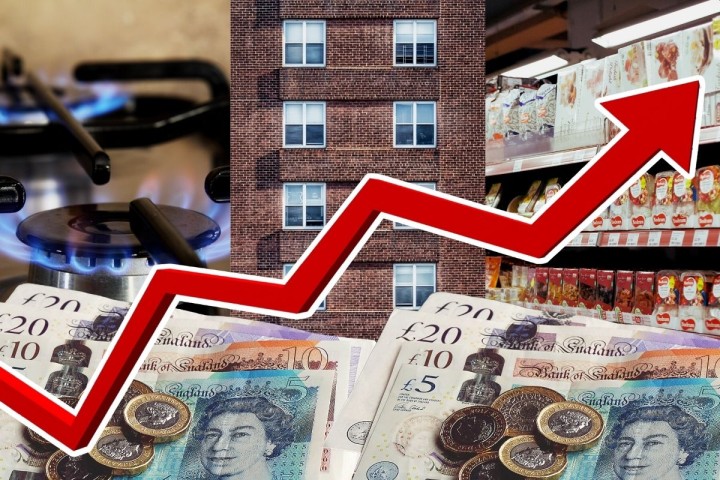 Britain is facing the worst inflation in western Europe / Image: Socialist Appeal
Britain is facing the worst inflation in western Europe / Image: Socialist Appeal
With many households already in poverty and struggling to make ends meet, Keith Anderson, chief executive of Scottish Power, said: “Come October, [the situation is] going to get horrific, truly horrific.” The French energy giant EDF says vulnerable customers in Britain will go from spending £1 for every £12 they earn on their energy to £1 for every £6 they earn this year. The employers’ association CBI said that putting pounds in the pockets of people struggling “should not be delayed”.
And the difficulties are not limited to energy, the central bank expects inflation to hit 10 percent before the end of the year, in spite of the growth rate falling. The Governor of the Bank of England says they are walking a “very, very fine line” between failing to keep inflation at bay, and the risk of creating a deep recession as the economy is hit by higher interest rates, as well as consumers' spending power being undermined by inflation. (‘Bailey warns of risk of persistent inflation from strong UK labour market’, Financial Times)
In fact, Bailey just predicted that inflation would hit 10 percent in the UK before the end of the year, but said that the Bank of England is powerless to do anything about it.
Central banks powerless as stagflation looms
The inflationary pressures are seriously hampering the post-COVID recovery. Throughout the pandemic, the central banks were pumping trillions of dollars into the economy to keep it afloat. This money is now fuelling the current inflationary spiral. In an attempt to rein in inflation, central banks are being forced to raise interest rates and remove (“taper”) the money put into circulation. However, in doing so, they're pouring cold water on the economy.
The worry is that, not only will they fail to curb inflation, but they will also sink the economy back to zero growth or even into recession. This is certainly what the Governor of the Bank of England has hinted at. This is what they refer to as 'stagflation' (stagnation and inflation at the same time).
Rising interest rates as well as rising cost of living, unless combined with a rise in wages, will undermine the purchasing power of the working class. Thus, it will put a big dampener on consumption.
The more far-sighted economists understand the dangers implicit in these conditions. In the New York Times, Victoria Greene from G Squared Private Wealth states:
“There are definitely a lot of open-ended and unquantified risks looming. [...] The U.S. economy lives and dies for the consumer, and as soon as this consumer starts to slow down. I think that will hit the economy hard.” (‘Market plunge reflects fear of pain to come’, 2 May 2022)
Meanwhile, Joe Hayes, an economist with S&P Global (the ratings agency), made a similar point in the Wall Street Journal:
“Given how rampant inflation is at present, it’s difficult to see sustained post pandemic recovery efforts offsetting the negative impact from rising prices.” (Global Growth Outlook Ebbs in Face of Ukraine War)
The starkest warning came from former Goldman Sachs CEO Lloyd Blankfein, who warned corporations to prepare for recession. In an interview with Bloomberg he said there was a “very, very high risk” of recession, citing government stimulus, supply chain problems, chinese lockdowns and war in Ukraine as creating enormous obstacles to central banks getting inflation under control. According to Blankfein, there’s a very “narrow path” to avoiding recession. (Ex-Goldman CEO says recession possibility is 'very high risk factor')
The reality is that central banks are caught between a rock and a hard place. They can’t let inflation spiral, but neither can they really curtail it, because they will cause a recession. And even a recession might be insufficient to bring inflation to heel.
The crisis of logistics
What is perhaps even worse than the impact that the crisis is having on consumer prices is rising prices further up the production chain. Cost increases here are much higher than in the field of consumer markets, and will inevitably have a knock-on effect throughout the system.
A serious crisis in logistics began during the pandemic, with the cost of shipping and freight transport increasing dramatically. Changing consumption patterns, combined with the anarchy of the market, created massive supply bottlenecks that massively increased prices of transport. These have eased over the past month, but the underlying costs have at the same time been increasing.
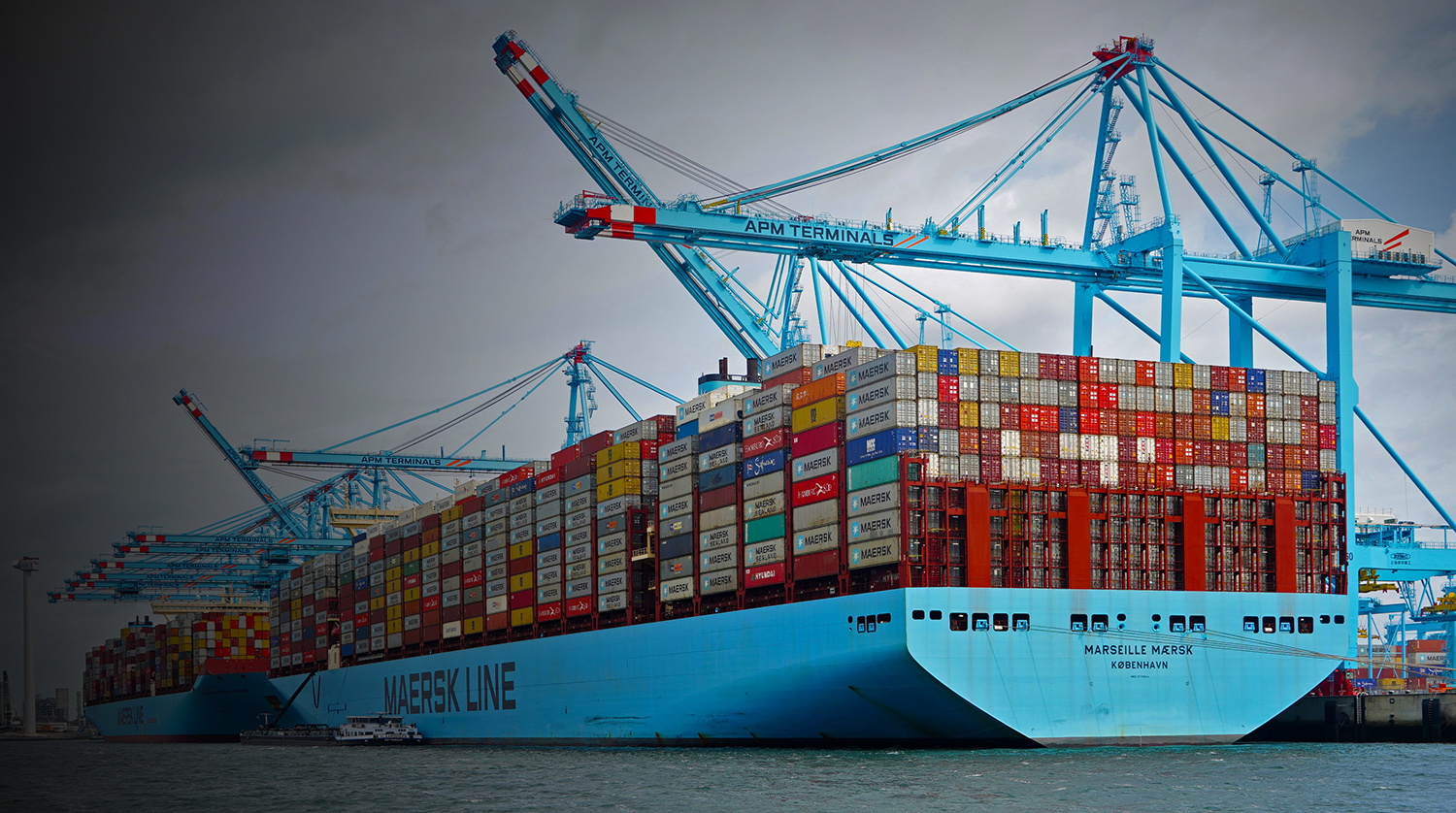 A serious crisis in logistics began during the pandemic – while bottlenecks have eased over the past months, the costs have at the same time been increasing / Image: kees torn, Wikimedia Commons
A serious crisis in logistics began during the pandemic – while bottlenecks have eased over the past months, the costs have at the same time been increasing / Image: kees torn, Wikimedia Commons
The price of diesel in Europe, which is particularly badly hit, has increased by about 63 percent compared to pre-pandemic levels. This is caused by the increase in the price of oil, but also Europe’s large dependence on Russian diesel exports.
Also, the cost of tires and spare parts have, anecdotally, often doubled. Pallets have also been affected by a big shortage. Around 25 percent of Europe's supply of soft wood, used to make pallets, is inaccessible because of the war and the sanctions. In addition, a yearly supply of 20 million pallets from Ukraine and Russia is inaccessible, leading the cost of pallets to almost triple, rising from €9 to €23. (‘The Ukraine war is hurting Europe’s pallet supply, and Russia’s army may be feeling the squeeze too’, Euronews).
The war in Ukraine is seriously impacting transport in several different ways. Whatever easing we have seen of transport prices in the past month or so, could easily go the other way, as the increased costs for logistics companies start to feed through the system.
Cost of raw materials
And it’s not just transport where industry is facing difficulties. The price of all kinds of raw materials for production are rising. Russia is one of the more important sources of minerals, many of which are used in modern production, and with the loss of much of the supply from Russia, prices are increasing.
Tesla CEO, Elon Musk complained about this at an earnings call for shareholders back in April: “I think the official numbers actually understate the true magnitude of inflation,” he said. He went on to predict that inflation will continue for at least the rest of the year, and added that suppliers were asking for 20 percent to 30 percent increases for parts.
And it’s not just Tesla. German producer prices for industrial products rose by 30.9 percent, which is the highest rate of increase since 1949. German industries are facing a cost hike in energy prices by 84 percent, with prices for natural gas up 145 percent. The price increases led the IMF to cut its growth forecast for the German economy by 1.7 percentage points.
The crisis in China
Already, China is in a sharp slowdown because of its COVID lockdowns, which are affecting an estimated 300 million people. Industrial production dropped by 2.9 percent and retail sales were down 11 percent in April. Car production was down 41 percent and new construction starts down 44 percent. (China: worse, FT) This will reverberate throughout the world economy.
The central bank and government are trying to boost consumer spending by boosting credit. But the measures are having little impact. China is in the middle of a crisis in real estate, starting with Evergrande. Only last week, another company, Sunac, defaulted on its debt. The measures, which are similar to those carried out in the West two years ago, will have little impact now, and prepare a worse crisis in the future.
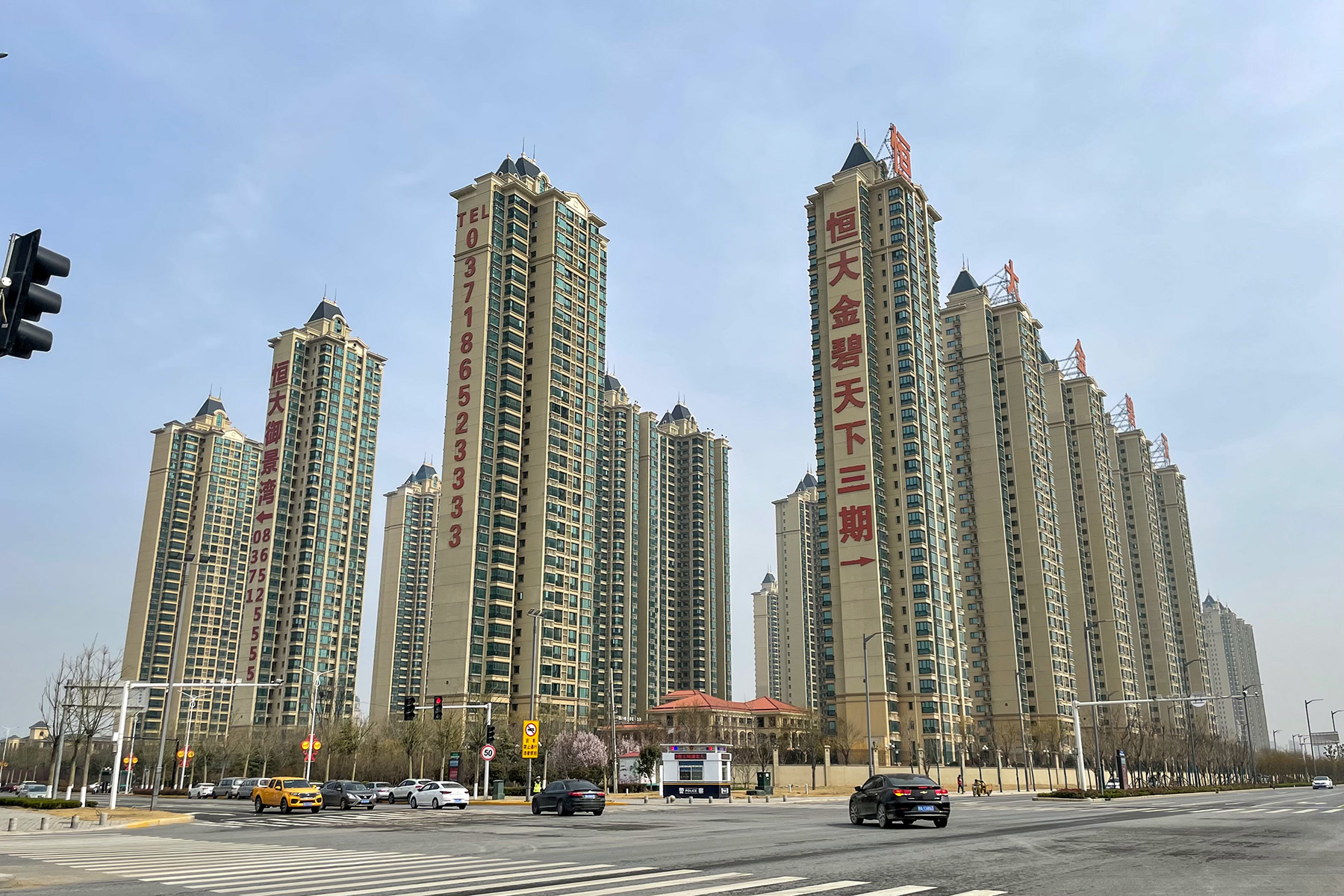 China is in the middle of a crisis in real estate, starting with Evergrande. Only last week, another company, Sunac, defaulted on its debt. The counter-measures introduced by the government, will have little impact now, and prepare a worse crisis in the future / Images: Windmemories, Wikimedia Commons
China is in the middle of a crisis in real estate, starting with Evergrande. Only last week, another company, Sunac, defaulted on its debt. The counter-measures introduced by the government, will have little impact now, and prepare a worse crisis in the future / Images: Windmemories, Wikimedia Commons
Over the past month, much of China's manufacturing output has been hampered by the stringent anti-COVID measures in Shanghai, the world's largest port. This has led to lower shipping costs, but higher prices for everything else.
The slowdown in production in China will remove supplies of all kinds of raw materials and consumer goods, putting even more pressure on world market prices. Of course, at a certain point, the lockdowns will be lifted, but as we have learned over the last couple of years, all kinds of bottlenecks emerge when lockdowns are lifted. Capitalism, because of its anarchic nature, is simply incapable of planning for such events, and government intervention is a very blunt tool to resolve these problems.
A threat to world trade
With all these different pressures emerging on prices, central banks will be unable to contain the situation. More worryingly still, the pandemic and increasing tensions between the world powers, with the war in Ukraine being the final straw, are causing globalisation to be rolled back.
Larry Fink, the CEO of the world's largest asset manager, BlackRock, warned about this in a recent letter to shareholders: “The Russian invasion of Ukraine has put an end to the globalisation we have experienced over the last three decades.”
Ever since the 1970s, inflation has been kept at bay partly by globalisation, with the resultant increasing international division of labour bringing down costs. Lenin and Trotsky explained that there are two barriers to the development of the economy (productive forces) under capitalism: private property and the nation state. The latter was partially overcome precisely by globalisation. Massive factories, like the ones that have been built in East Asia, which have a very high level of productivity, have pushed down prices of consumer goods.
Globalisation has lowered the price of machinery, and made it more profitable to invest in mechanisation and other labour-saving devices. The IMF considers that the lowering of tariffs and other trade barriers are responsible for 60 percent of the reduction in the costs of machinery compared to consumer products.
So, even if the productivity of labour hasn't grown as much as in the past, it would have been even worse without the expansion of world trade. The opening up of world trade, what the bourgeois commentators dubbed ‘globalisation’, was essential to keeping the economy growing, and inflation at bay, over the past few decades, but this has now come to an end.
End of globalisation
With globalisation being thrown into reverse, companies are realising that their supply chains are very vulnerable to what they call 'geopolitical risks'. That is, conflicts involving the main imperialist powers.
So, we find for example that the German car industry had to shut down some production lines because it lacked the wiring harnesses that were being produced in Ukraine. This affected Volkswagen, BMW and truck maker MAN.
The EU and the US are desperately trying to find alternative sources of oil, diesel and natural gas. But it is very difficult and going to mean much more expensive fuel in the coming period.
Although all the focus at the moment is on Russia, the real adversary of the US bourgeois is China. The US ruling class has realised that some key components are produced almost exclusively in China and its environs, and are taking measures to reduce their reliance on these supplies. But this process of ‘decoupling’ from Chinese-produced materials is neither easy nor cheap.
The indispensable lithium
As everyone is trying to switch over to electric cars, a big question mark has been raised over how to get hold of the components for the batteries, which is the most difficult part of the vehicle to produce.
At the moment, China produces 80 percent of battery-grade lithium hydroxide, which is the key component in batteries. Although the lithium is often mined elsewhere, the refining is overwhelmingly done in China.

The question that the car companies and others are asking themselves is: what if the US was to impose sanctions on China like it is doing on Russia right now? How would all those manufacturers that rely on lithium batteries cope?
In response to this uncertainty, Western companies are developing their own lithium hydroxide production capacities. One of the new refineries is being built in Australia, in the lithium mining area of Kwinana. Doing the refining in Australia would protect Kwinana's production from geopolitical risk.
A trader from Redpoint Investment Management commented to the FT:
“The fact that some of these materials are going to become so important means you need diversity of supply. You can’t have the risk that it comes from one place.”
He continued:
“They’ll have to run the operations under Australian government rule. [So] if it’s based in Australia, you do get rid of geopolitical risk.”
Just this week, plans were announced for another plant in the UK, as a complement to the building of new battery factories in Europe.
Who controls the microchips?
Another example is the production of semiconductors, 75 percent of which are now produced in East Asia, led by Taiwan and South Korea, but increasingly also China. Taiwan alone produces 90 percent of the most advanced microchips.
As China is increasingly asserting its control over the South China Sea, it is also asserting its control over the most important trade routes for semiconductors. Any serious sanction or trade war between China and the United States could possibly cut off the supply of semiconductors, which is essential for all whitegoods, electronics and vehicles.
This has led to attempts by western governments to develop their own microchip industry. The US enacted a “Chips Act” last year, and the EU is following suit this year. As the CEO of Intel Pat Gelsinger recently stated, “We seek to rebuild the entire supply chain on US soil”. (Cspan archive)
His sentiments are echoed by US President Joe Biden, who said in a speech on 21 January: “To be able to say Made in Ohio, Made in America, what we used to always be able to say, 25-30 years ago. That's what this is about.” (‘Remarks by President Biden On Increasing the Supply of Semiconductors And Rebuilding Our Supply Chains’)
This is protectionism, pure and simple, and it is going to wreak havoc with the world markets. Of course, some of these sectors are facing shortages anyway, but by putting up barriers and granting subsidies to domestic companies, governments and companies are raising the cost of production.
Refashioning supply chains will inevitably lead to higher prices in the long run. It is one of the consequences of the trade war with China that began under Trump, and which continues to this day. But it was amplified first by the pandemic and now by the Ukraine war and the resulting sanctions.
By shifting their supply chains away from Russia and China, companies are making them more expensive. Yet, amidst increasingly convulsive international relations, they have precious little choice.
The cost of war
In all this, the ruling class is solemnly telling the workers that it is our duty to do the right thing and maintain the sanctions on Russia. Both Biden and UK foreign secretary Truss suggested that a price will have to be paid, but it is a price worth paying. Of course, they will not be paying it themselves.
Workers will be asked to pay the tens of billions of dollars of arms that are being poured into Ukraine at some point. They will be asked to pay for massive increases in domestic military expenditure. There’s no such thing as a free lunch, as the capitalist commentators are always keen to point out.
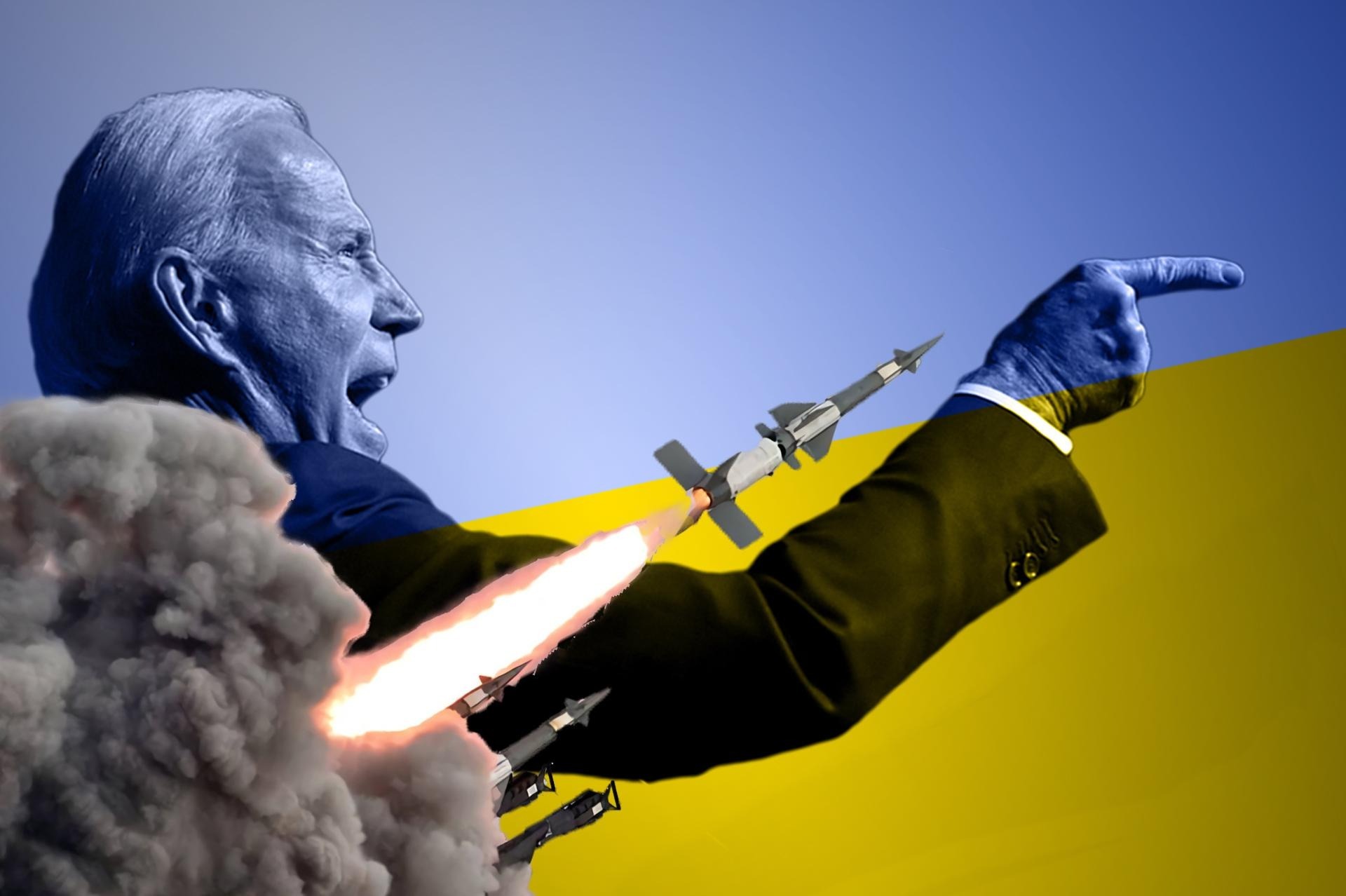 In all this, the ruling class is solemnly telling the workers that it is our duty to do the right thing and maintain the sanctions on Russia. Both Biden and UK foreign secretary Truss suggested that a price will have to be paid, but it is a price worth paying – of course, they will not be paying it themselves / Image: In Defence of Marxism
In all this, the ruling class is solemnly telling the workers that it is our duty to do the right thing and maintain the sanctions on Russia. Both Biden and UK foreign secretary Truss suggested that a price will have to be paid, but it is a price worth paying – of course, they will not be paying it themselves / Image: In Defence of Marxism
But it doesn’t stop there. The massive expansion of military expenditure will only make inflation worse. Instead of using resources to raise education standards, or invest in new machinery, better public transport or even roads, the government will be putting even more pressure on strained markets for raw materials to produce very expensive weapons. At best these weapons are merely very expensive pieces of junk, at worst, they will be used to kill workers and farmers, and destroy factories and farms. Far from solving the problems of the economy, they merely make the situation worse.
In a striking article in the FT, Martin Sandbu lays out what the ruling class is thinking, but has the good sense to not say too loudly. He mentions that people won’t be able to buy healthy meals for their children, won’t be able to pay for their energy and that we might have to ration some essential goods. He suggests that politicians should explain the pain that is coming and that is due to the war (among other things), and then he says that this is the “price of freedom… paid by Ukrainians first and foremost, but also by so many of you”. (Western leaders must prepare public for a war economy)
With such solemn declarations, many workers will wonder if someone is going to ask their opinions? Is their children’s health really something to sacrifice at the altar of NATO’s imperialist ambitions? These commentators and politicians are once more talking about us being ‘all in it together’ and the ‘broadest shoulders must contribute more’, but in reality the burden is far-from-evenly shared. It is abundantly clear that the price for the imperialist power struggles is being paid by workers and the poor, and no one else, and the price is getting higher by the day.
The new normal
“Chair Jay Powell has emphasised the importance of a ‘soft landing’. The Philadelphia Fed’s Patrick Harker cautions that the Fed should not ‘ruin the economy’ by being ‘too aggressive’ on inflation. San Francisco president Mary Daly said the Fed should perform a hike such that inflation falls to 2 percent, five years from now, implying that she is content with it staying above the central bank’s target for a half decade!” (‘The Fed has changed its message, but not the way you think’, FT Alphaville)
The bourgeois are now seriously worried about the prospect of inflation that they can't get under control. The prospect now is not for a quick return to inflation of 2 percent or so, but that this higher inflation will last for years and possibly decades.
This has serious implications for the class struggle. 5-10 percent inflation will quickly eat away at wages, and depress real earnings. It will be a very quick transfer of money from the workers, who will get less for their wages, to companies, which will charge higher prices.
Not all companies will benefit, mostly it will be the big monopolies. They can control prices from suppliers and can set prices for consumers without running the risk that other companies will undercut them. The losers will be the working class, unless they struggle to defend the purchasing power of their wages. Inflation is therefore a finished recipe for class struggle.
It's symptomatic of the coming period that European Central Bank President, Christine Lagarde, had to send an email to employees at the ECB arguing against linking wage increases to inflation (a sliding scale of wages). She said “an indexation of salaries to inflation is not desirable and not intended.” Apparently, the union representing these workers had asked for precisely such an indexation. (Lagarde Spurns ECB Staff Plea for Pay Rises Linked to Prices)
Lagarde knows this is an explosive question. She is not the least bit interested in setting an example for others to follow, because demands like these are inherent in the situation. What's the point of agreeing to a 3, 4 or 5 percent wage increase if inflation turns out to be 8 percent? Workers will have to constantly be on the guard or see the purchasing power of their wages disappear.
These inflationary pressures will force a response, not just from workers in the advanced countries, but the billions of poor around the former colonial countries, who can barely afford to buy food. The movements in Sri Lanka and Kazakhstan were sparked by the cost of living increasing dramatically. These countries will not be the last where we see such developments.
Persistent inflation is a sign that the capitalist system is in a deep crisis, that it can not find an equilibrium. Now, many countries are facing the unappealing prospect of both high inflation and recession. The western imperialists, so enthusiastic about making Russia bleed in Ukraine, will come to regret their actions. The continuation of the war is turning the situation from bad to worse. Inflation will act as the mole undermining the already unstable political systems all across the world.

